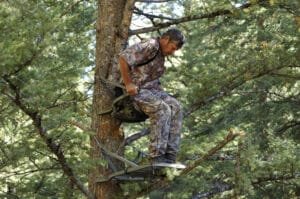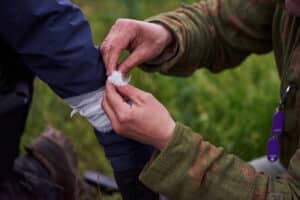 ☰ Menu
☰ Menu
Hunting is an extremely popular fall outdoor activity. In 2023, 15.9 million Americans have a hunting license. Many hunters flock to Colorado each year, as the Rocky Mountains contain diverse wildlife that will satisfy just about any hunter. In addition, the beautiful backdrop makes for an exhilarating hunting experience.
While Colorado’s back country offers world class hunting opportunities, the conditions are extremely challenging – even for the most experienced hunters. Many of the wilderness areas you must hike through to access wildlife are difficult. This means that if an injury occurs, it may take a long time to receive the help you need.
There is a risk of injury anytime you’re out in the wilderness, and hunting is no exception. Even the most seasoned hunters suffer injuries from time to time. While there is always a risk of an accidental gunshot wound, these injuries have declined recently as mandatory hunter safety courses have become standard in many states. For many hunters, there are far greater dangers than the risk of being shot. Below are some of the most common hunting injuries to be aware of.
If you hunt from a treestand, falling injuries are by far the greatest risk you face. It’s easy to slip from a treestand while zeroing in on an animal. In addition, there is a significant risk of falling while climbing up and down from the stand since carrying a gun makes the climb more difficult. Finally, an old or improperly mounted stand can easily collapse, resulting in devastating injuries.

Common symptoms of fractures and dislocations include:
Anytime you fall from a high location, you risk a spine injury. Common symptoms include:
Walking miles up and down mountains with heavy guns can place significant stress on your muscles, especially if you’re not in great shape. As a result, muscle strains and other overuse injuries are relatively common among hunters. Symptoms can vary depending on the severity of the injury and may include:

The Rocky Mountains provide access to high elevation hunting opportunities. While the views at high elevation are spectacular, hunters coming from sea level must be careful about developing elevation sickness. This condition can potentially be deadly if there are comorbidities.
High altitude pulmonary edema (HAPE) is a condition resulting in the build-up of fluid in the lungs. It can be fatal within a matter of hours without proper treatment. Hunters with HAPE may experience the following symptoms:
If you live at sea level and visit Colorado for a hunting trip, it’s critical to prepare for the impact of high elevation on your body. In particular, cardio training is essential since it promotes a more efficient use of oxygen throughout your body. Including a mix of running, hiking, biking and sprints in your cardio workouts will help train your body to function when deprived of oxygen, and this will reduce your risk of elevation sickness while hunting in Colorado.
Injuries may occasionally occur when you’re hunting in the White River National Forest along the Western Slope or anywhere else in Colorado. Colorado Advanced Orthopedics can help you restore full function and resume a pain-free life if you suffer an orthopedic injury in a hunting accident.
Our team includes some of the most highly experienced, board-certified and fellowship trained orthopedic surgeons in the state. Meeker is a hotbed for hunting and as a result, our orthopedic surgeons regularly treat common hunting injuries. This in-depth experience with hunting injuries allows them to recommend the right approach to ensure you make a full recovery.
Contact us today to schedule an appointment. Colorado Advanced Orthopedics serves patients in Meeker and throughout the White River Valley.
Subscribe to our monthly publication highlighting Life's Joy and getting back to your life. We feature health tips, being out and about, and bringing joy to daily life.
Subscribe